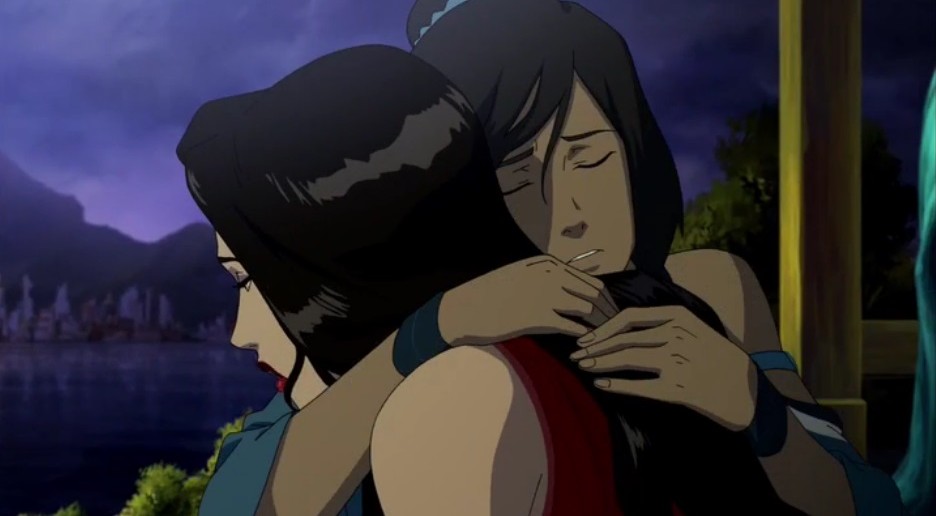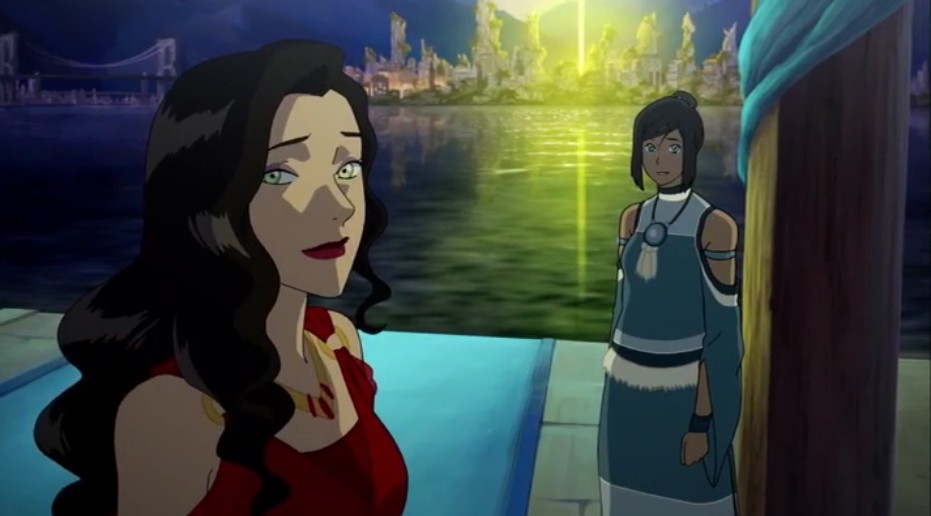With the finale of The Legend of Korra having officially aired, we can now see the ripples its aftermath has created throughout the media. When protagonist Korra and her close female friend Asami Sato ended the show by walking into the literal spiritual sunset together, the implications of romance were hard to deny, so much so they’ve been discussed, dissected, praised, and critiqued by media and fans alike.
The show has had a rough time being handled by the stumbling hands of Nickelodeon. Due to the immense popularity of its predecessor Avatar: The Last Airbender, Nickelodeon greenlighted the show. This was in spite of some reservations that Bryan Konietzko revealed to NPR the network had in backing a show with a female lead. However, since it’s inception The Legend of Korra has faced many troubles, including clumsy Twitter handling—in a humorously embarrassing moment, the official Nick Twitter retweeted a fan made edit promoting it as an in show piece—to the network pulling it from TV all together.
The reason why the show was pulled? Content. Executives felt that the show—after the first season’s finale included two characters dying on screen—was too dark for its Saturday morning timeslot. So they pulled The Legend of Korra from it’s original Saturday morning TV timeslot and moved the show to Friday nights. Unfortunately, the time switch didn’t hold much effect and the network pulled the show completely off television, only to show the final two seasons online instead, which, coincidentally or not, only gave the creators affectionately called “Bryke”—a name coined by the fandom and derived from combining Bryan Konietzko and Michael Dante Dimartino’s names—and their team more free reign.
It’s been argued by some fans that the third and fourth seasons of Korra are the best of the show’s run. With many feeling frustrated by the pacing and lack of character development in the first two seasons—not to mention the forced and at times jarring love triangle that was between Korra, Mako, and Asami—the third season focused instead on plot, characters, and began the foundation for Korra and Asami’s growing friendship. The show also closed the romantic subplots both women had with Mako after season two.
This foundation grew a prominent fanbase that garnered the attention of both the creators and Korra’s voice actor Janet Varney. However, fans were very reluctant to hold much hope that the two could actually become “canon” within the context of the show. Given that American television still struggles with the inclusion of queer sexualities in adult content, including diversity in children or family based content is even more of a pipe dream.
Yet, that’s exactly what happened. The finale aired with such strong implications that Korra and Asami’s friendship had finally grown into more, treading into romantic waters, that high profile sites such as Vanity Fair, The Huffington Post, A. V. Club, and Forbes have all commented and supported the romantic relationship between the two women. Furthermore, both creators have officially confirmed “Korrasami’s” legitimacy on their personal Tumblrs.
With the in-show evidence, along with the confirmation from the creators, a greater discussion is brewing about queer characters within the medium of children based cartoons. I was lucky enough to be given the chance to further discuss not only the romantic relationship between Korra and Asami, but also the inclusion of queer characters and diverse sexualities in children’s media with some fantastic fellow writers here at Woman Write About Comics.
So, let’s get started by introducing ourselves and giving some general thoughts on the Korra finale.
Desiree: Hey guys! I’m Desiree the lucky lady putting this roundtable together and a Staff Writer here at WWAC. After seeing the Korra finale, I just knew I had to bring that final Korrasami moment to the attention of my fellow WWAC writers and contributors. I’ve been researching queerness in children’s media for a while now, and this seemed like a perfect time to open up a larger discussion about the subject.
I’ve been a big fan of this past season of Korra. Seasons three and four really came together in terms of story, music, direction, and character development. The changes that occurred in season three tightened the whole show up a lot. I loved the increased focus on female characters and female relationships both this season and the last. The Beifong clan is wild. The battle scenes this season have been fantastic, and the Korra/Kuvira fight did not disappoint.
The finale wrapped up a lot of storylines nicely and gave each characters a nice little moment to both shine and close this part of their lives to look towards the future. I was never really invested in the Varrick/Zhu Li relationship, but I really did enjoy them in the finale. They’re the Tony and Pepper of this universe.
I’ve been shipping Korrasami since last season, but it was always a far off dream. They were something I shipped passionately, but with reservations, because this is children’s media and censorship is still alive and well.
I was happy with their moment of comfort and caring, because that’s what their relationship has been about. Sincerity, compassion, love, and friendship were really emphasized in their final moments together. It was beautiful and they totally got spirit-married; their stance even matched Varrick and Zhu Li’s during their wedding.
Rebecca: My name is Rebecca and I’ve been a fan of Legend of Korra since the beginning. I watched the predecessor show, Avatar: The Last Airbender, on Netflix in 2009 or 2010, and when I heard about the announcement of the show I was already stoked. Since then it mostly hasn’t disappointed.
And I’m also one of the fans who are pretty much the opposite of the introduction. I really enjoyed season one, and that includes the love triangle. It’s something of a tired cliche—I’m not going to admit otherwise, but I liked how in contrast to the Aang/Katara relationship in Avatar: The Last Airbender, which seemed to be unnecessarily drawn out to the point where I got frustrated by it, the feelings of the characters were entirely up there on screen. Meanwhile, in episodes like “The Spirit of the Competition,” the narrative seemed to be dealing with the characters feelings—and all the messiness that came from them—head-on. The characters made a lot of mistakes, especially Mako, and hurt each other, but they tried to move on from those mistakes to a place of caring. In the second season, on the other hand, the Korra/Mako/Asami plotline seemed to be a sort of rehash, and while I came away from the first season shipping Makorra (and still do) their breakup was still completely understandable.
Which was why, even though I wanted to see Korra and Asami become friends, I was frustrated that when they made it official in the beginning of season three, they brushed aside the romantic drama of the first two seasons in a way that seemed inauthentic. They seemed to become best friends almost automatically (“Hey, we both kissed this guy behind the other’s back when we were dating him! Weren’t we silly?”), and while I certainly didn’t want to see them fight for a season or anything like that, it didn’t feel particularly earned.
 I liked a lot about seasons three and four. The extended Beifong family were a great addition to the cast, especially Suyin and Opal, and I think the villains of both seasons were much better than the first two, but I often feel like the writers were never sure of what Korra’s immediate circle of friends were supposed to be doing after their clear narrative purposes in season one (witness how Bolin’s changed occupations with every season). And, unfortunately, I think Asami suffered the worst from this. I don’t feel like she’s had a strong narrative arc throughout any of the seasons. Unlike Mako, who got a soliloquy explaining himself in the maligned clip show, we’ve never had any big speeches about her hopes or dreams or how she sees the world, and most of her storylines have involved her reacting to other people’s betrayals and being sad, or just being generally pleasant and helpful to Korra. The finale of this show was particularly frustrating in that regard—why did we need to call back Hiroshi to figure out how to defeat Kuvira’s giant robot? Why couldn’t Asami have figured that out herself?
I liked a lot about seasons three and four. The extended Beifong family were a great addition to the cast, especially Suyin and Opal, and I think the villains of both seasons were much better than the first two, but I often feel like the writers were never sure of what Korra’s immediate circle of friends were supposed to be doing after their clear narrative purposes in season one (witness how Bolin’s changed occupations with every season). And, unfortunately, I think Asami suffered the worst from this. I don’t feel like she’s had a strong narrative arc throughout any of the seasons. Unlike Mako, who got a soliloquy explaining himself in the maligned clip show, we’ve never had any big speeches about her hopes or dreams or how she sees the world, and most of her storylines have involved her reacting to other people’s betrayals and being sad, or just being generally pleasant and helpful to Korra. The finale of this show was particularly frustrating in that regard—why did we need to call back Hiroshi to figure out how to defeat Kuvira’s giant robot? Why couldn’t Asami have figured that out herself?
I love a lot of the female characters on this show, from the heroine to the bad girls, but unfortunately, as much as I’ve tried, Asami just isn’t one of them. So, when Asami and Korra held hands and walked into the Spirit World together, I was disappointed. It wasn’t completely unearned, but it felt as dissatisfying as most of Asami’s development. So, overall, I’m happy that Korra’s bisexual, but I just plain don’t like her girlfriend.
On the other hand, I also thought that in Avatar: The Last Airbender, the romances between Aang/Katara and Zuko/Mai were also poorly done, so this may be just a point where I don’t think Bryan Konietzko and Michael Dante DiMartino are successful creators in general.
Jamie: I’m Jamie, and I’ve been a cartoon and comics fan pretty much my whole life. I was there for the first airings of Avatar The Last Airbender, becoming an instant fan. I was there for the bumps and the delayed airings. I am still there for the reruns of several of my favorite episodes. So, when there was an announcement that there would be another series in this world, with a female Avatar being the next bender in the cycle, I was excited.
I am an older fan, so I have a more cynicism-through-practicality approach to the things I see the creative team do. I was indifferent at worst to the Korra-Mako-Asami love triangle, because fictional stories need conflict, and unfortunately, male writers still believe that this sort of “romance” is what women and girl viewers want to see.
I wasn’t surprised that Korra “won.” She’s the star. I hated the Aang/Katara romance, because it was literally “love at first sight” and Katara seemed motherly or big sisterly at best until the finale, which was just the tired First Girl Wins trope combined with the equally tired Hero Gets The Girl trope. It felt forced to me. The Zuko/Mai romance was the same. Mai was an unlikeable character with a Freudian Excuse for why she was such a gloomster—and that was treated as a fair match to the much more complicated background we got for Zuko to explain his pain, conflict, and personality. It’s frustrating to see the creative teams take shortcuts to justify making the less interesting choice over and over and over again, show after show.
So when things got messy in seasons one and two, I chalked it up more of how Bryke portray teenagers. Full of emotion, drama, and intense feelings they can’t handle. Hamfisted. Then, as the seasons progressed, Korra and Asami got past their feelings for Mako and built a friendship (even while it was being played as comical that Mako’s two exes were getting tight). They turned out to have things in common, which was a nice contrast from Korra’s first impression that they had so little in common.
As of season three, when people started shouting Korrasami on Tumblr and Twitter, I rolled my eyes, thinking, “Are they really that naive? Bryke likes to ship tease. They did it to me with Zutara in the original series. There is no way Nick is going to let them do a same sex romance as endgame. It’ll be Mako or some other boy who comes out of left field.” I wasn’t personally invested in who Korra ended up with; my concern was seeing her grow as an Avatar. My ship didn’t sail in the previous series, so I just didn’t get on board this time.
So I was surprised—but very pleasantly so—to see I was wrong. If you’re a big old homophobe, you can rationalize it away as “they’re just two good friends, off to see something interesting”” But if you’re open minded you will see it as intended: a parallel to Aang and Katara taking a quiet moment away from the post-climax celebration to begin their relationship. It won’t even take two seconds on Tumblr to prove this contention: the fans have already done GIFsets illustrating the intentional visual cues and parallels.
My awesome teammates here have also commented on the matching body language. Aang and Katara turned to face each other. Varrick and Zhu Li turned to face each other, holding each other’s hands. Asami and Korra took the same pose the other two romantic couples took. Even the villains, Batar and Kuvira did the same pose. It’s intended to be a lovers’ pose.

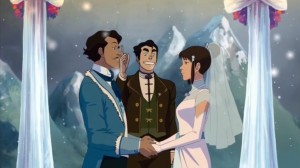
So, even though sites like The Huffington Post have fully embraced the implication that Korra and Asami have engaged in an romantic relationship, other sites, such as the 2Paragraphs, who dubbed them “The New Thelma and Louise,” and even some fans have claimed their relationship is strictly platonic. What are your thoughts on the media and fans reading women’s relationships as strictly platonic instead of potentially romantic?
Desiree: This reminds me of when magazines called Cara Delevingne and Michelle Rodriguez “gal pals” even though they were dating. I’m just going to say it: if Korra had walked into the spirit world with any male character there wouldn’t be all these claims of “just friendship.”
I wonder if this reluctance to formally acknowledge queer female relationships of both real life and fictional women is due to the fact we, as a society, still prioritize male relationships whether they be with other men or women. Lesbian and bisexual women are often accused of experimenting or seeking men’s attention, while gay and bisexual men are often accused of either being predators towards straight men, or just really gay guys in disguise. Either way, both stereotypes are directly connected to straight men themselves. I feel that these attitudes affect how people digest their media and why queer relationships between women are either discredited as strictly platonic or largely ignored by fandoms in favor of male dominated relationships.
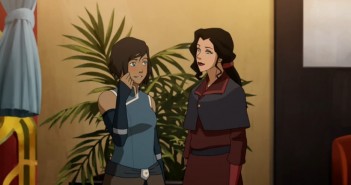 Rebecca: I don’t think what Desiree said is completely fair. Given that Bolin had moved on and dated other people, if he was the one at the finale there would have been a lot of backlash. Meanwhile, although Korra and Asami had a lot of moments that could have been read as romantic—Asami helping Korra dress for Jinora’s ceremony and offering support during her sickness, Korra only writing to Asami during her convalescence, Korra blushing at Asami complimenting her hair and the both of them sharing hugs—none of them were explicitly romantic. Meanwhile, Mako and Korra had a more explicit romantic history, and they shared some hugs and moments that could have been conceived as platonic, I think the tendency to interpret them as romantic by fans of that relationship was understandable given their history.
Rebecca: I don’t think what Desiree said is completely fair. Given that Bolin had moved on and dated other people, if he was the one at the finale there would have been a lot of backlash. Meanwhile, although Korra and Asami had a lot of moments that could have been read as romantic—Asami helping Korra dress for Jinora’s ceremony and offering support during her sickness, Korra only writing to Asami during her convalescence, Korra blushing at Asami complimenting her hair and the both of them sharing hugs—none of them were explicitly romantic. Meanwhile, Mako and Korra had a more explicit romantic history, and they shared some hugs and moments that could have been conceived as platonic, I think the tendency to interpret them as romantic by fans of that relationship was understandable given their history.
That being said, as soon as it happened and as much as I thought those previous hints weren’t romantic, I knew what was what. Most people who shipped Makorra seemed to know what was what too. Those who are arguing otherwise are probably working on some combination of homophobia or ship attachment, and while I can understand disappointment at a certain point you have to move on.
Jamie: My read on why the media and the fans read women’s relationships as strictly platonic instead of acknowledging it as romantic? It breaks down along a few lines.
Homophobia of course is the first. People are still being raised to hate, fear, decry, and destroy anything that is different. The second, though, is Mean Girl syndrome. Hollywood, even at the kid’s programming level, likes to portray women as rivals and bitter competitors. Girls being friends because they like each other, get along, and have things in common or disparate things they can learn from each other is becoming less of a rarity. But it’s still almost knee-jerk for the media to think of them as potential enemies and think of anything different as “aww, look, they made friends!”
The third is that we’re just finally, thankfully, growing out of the period in which Hollywood only portrayed women in intimate relationships together for the sole purpose of titillating male viewers, rather than representing queer women finding relationships because those are the relationships they want and choose.
And the last is that it’s still, in a lot of ways, a man’s world. Korra was almost not greenlit because of a female star. Nick was on record as being afraid boys wouldn’t watch. And that apprehension continued to manifest as them screwing around with the schedule and the location of airing, to say nothing of not even bothering to release a Legend of Korra toyline. Aang had one because he’s a boy and boys play with action figures. They wouldn’t give Korra one because a girl plastic figure isn’t an action figure. She’s a doll.
All that aside, though, yes, all the Korrasami lead up was set up in such a way that each viewer could interpret it as they so desired. I saw the blush and shrugged it off, because Korra has always been insecure about “girly” stuff. It didn’t have to be potentially romantic; it could have been platonic. The finale, though, puts it to rest definitively, and anyone saying different is in denial.
There’s been some discussion within fan circles that pairing up Korra and Asami has been anti-feminist due to a lack of female friendships in the media. How do you guys feel about this?
Desiree: That’s dumb. Sorry, but really, the show has a slew of female friendships and relationships to chose from. Most of the focus on the Beifong family has been on Lin, Su, Opal, and Toph—four women. Korra has built strong relationships with all these women as well. So to say that Korra and Asami being together romantically over just being gal pals when there’s already a plethora of female relationships on the show feels like a paper thin masking of dissatisfaction that the pair ended up together.
I do think having more positive female friendships is important in our media, but more so, on developing more positive female relationships. And positive doesn’t necessarily have to mean good either. I have a lot of problems with Once Upon a Time, but I do thoroughly enjoy the many female relationships on the show, both the good and bad. We should be able to enjoy a wide range of female relationships in our media, something comics like Birds of Prey, Fearless Defenders, and Rat Queens showcase.
Rebecca: I don’t agree with that. I’m surprised that anyone is saying that at all, to be honest. I remember fans in seasons one and two arguing that since Korra and Asami weren’t more explicitly friendly/romantically involved the show was anti-feminist, but in my experience it’s always featured strong female relationships, whether the sisterly relationships between Korra and Jinora or the growing respect between Korra and Lin. While I do wish the romance between Korra and Asami had been better-written, I think the show overall has done a lot of great stuff for the representation of women of color in the media as well as women in general, and I hope it’s a trend that continues.
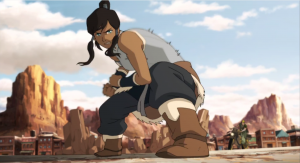 Jamie: Anti-feminist? Really? One character is the most powerful bender in the world, who doesn’t let anyone push her around. The other is a genius martial artist who can run a company (Varrick wasn’t trying to blow it out from under her). They didn’t get along at first because of Korra’s ideas, but she eventually learned better and learned to respect Asami for the badass she is, while Mako was still trying to treat her like a delicate flower who needed to be protected. The woman had an electro-taser gauntlet. She didn’t need protecting! And Korra and Asami, and all the women around them, including Kuvira, did all their badass strategizing and fighting fully clothed.
Jamie: Anti-feminist? Really? One character is the most powerful bender in the world, who doesn’t let anyone push her around. The other is a genius martial artist who can run a company (Varrick wasn’t trying to blow it out from under her). They didn’t get along at first because of Korra’s ideas, but she eventually learned better and learned to respect Asami for the badass she is, while Mako was still trying to treat her like a delicate flower who needed to be protected. The woman had an electro-taser gauntlet. She didn’t need protecting! And Korra and Asami, and all the women around them, including Kuvira, did all their badass strategizing and fighting fully clothed.
I would agree with Desiree about the wonderful population of women in the series. Korra has had relationships of different levels of friendship with all of them: Katara taught her healing bending and the importance of patience. Kya taught her that it was okay to seek her own way in the world. Pema taught her that you can be a mom with a big family and still live life on your own terms. Jinora taught Korra that being young doesn’t mean you don’t know your stuff. The Beifongs taught her that despite messy past history and different approaches to life, that you can still find common ground with your family if you want to. Zhu Li and Korra didn’t get to bond much, but they didn’t need to. Korra was already empowered enough to step up and demand what she wants from another person; so maybe Zhu Li learned that from Korra. While I agree there are a shortage of women friendships in “the media” as a larger whole, that’s not true with The Legend of Korra, and trying to depict this couple as a blow to women having friendships is such a stretch I’m surprised I can’t hear vertebrae popping.
Katie Schenkel from The Mary Sue wrote about wanting a more explicit confirmation of Korra and Asami’s romantic feelings and relationship. Is this a fair criticism?
Desiree: I think it’s fair, at least in a sense that this moment shouldn’t be all we ask for from our children’s media, but the new stepping stone to push for more.
Rebecca: I agree with it, too, although for me my problem is less with the ending than everything that came before it. Korra was very explicit with her feelings about Mako in the first two seasons. Even if Asami and Korra couldn’t kiss, I think a little more time spent on them relating to each other—not just talking about the big monster of the day or figuring out how to get out of a jam—would have gone a long way. I think the two of them kissing or saying “I love you” would have been a strong message, but I wanted more to lead up to that.
Jamie: It’s absolutely fair in my opinion. I said it once already: Heteronormatives get their happy ending kisses. So, while it was great that he two women got together, happily and romantically, there’s wiggle room for the homophobes that they don’t deserve, at the expense of the GLBT+ who are short-changed. I mean, the fans saw the subtext, but it shouldn’t have to be subtext. It should just be plain old text, just like the romantic relationships of hetero characters. Did it need a little more obvious lead up? Probably. But if it had been there, Nickelodeon might’ve seen it coming and nixed it altogether.
The romantic relationship between Korra and Asami was officially confirmed by Bryke themselves. However the romantic aspects of their relationship existed heavily in subtext, this could be the fault of censorship on the networks part, but how does this affect your views on the progressive nature of this event?
Desiree: Originally I thought the final moment wasn’t perfect, but still worthy of celebration. I stand by that, but with the addition of appreciating Bryke’s comments and support, particularly in Konietzko’s piece where he talks about how the moment isn’t perfect and they can do better—we can do better. As a queer woman, I really appreciated that acknowledgement. Too often I see people mentioning a character’s sexuality after the fact wanting some sort of praise for it.
A character’s queer sexuality shouldn’t be hidden underneath layers and layers of subtext so thick you need a microscope to find it. Only to be confirmed after the fact by the author, when the series is safe from boycotts or major financial backlash. Am I referencing Dumbledore? Yes, yes, I am referencing Dumbledore.
This didn’t feel like that. The final moment between Korra and Asami felt very romantically genuine, and Konietzko implies that there was a line drawn by Nick they couldn’t cross (obviously a kiss). Which is a shame, but only emphasizes that censorship is still something we’re dealing with in our media that’s preventing marginalized groups from having their stories told to larger audiences in fear of bigotry.
Rebecca: Well, before the confirmation happened and despite my frustration with how both the friendship and romantic aspects of Korra and Asami were handled, I thought it was a good thing, and I still do. And while I do think a work should be able to stand without creators having to explain their intent, I think confirming it head-on was a good thing.
That being said, I have a big problem with Bryan Konietzko’s confirmation post. I really like Bryan Konietzko and Michael Dante DiMartino and get frustrated with some of fandom’s more ludicrous smears against them. But Konietzko’s comment that if you didn’t think the ending made sense you were “looking at it through a hetero lens” is really condescending and makes me genuinely angry the more I think about it. I saw some of the hints. I saw some of the hints as I was watching them. I can think they’re not effective without being homophobic.
Now, at a certain point: okay, I’m straight, so naturally I’m going to perhaps have some privilege blinders in that regard, and a straight person saying to another straight person that they’re homophobic is one thing. I disagree, but at some point our opinions on this as straight people are going to be removed and subjective. But I’ve seen so, so many people online even before the confirmation say, “Look, I’m queer and this relationship felt badly written to me.” For a straight guy to basically say to them the equivalent of “If you don’t get my work, check your privilege” is massively unfair and hurtful to them, and I’ve seen a lot of queer fans rightfully upset about that since the announcement.
Jamie: Any step in the right direction is something to celebrate as far as I’m concerned. This is a step forward from Xena and Gabrielle. It’s not cutesy camp “are they or aren’t they, bet you think they are!” So yes, it’s a small amount of progress, but that doesn’t mean the progress should be dismissed because it’s not a big enough leap forward. As a black woman, I’m seeing the same sort of eye-rolling response to the release of the new Annie movie. The complaints are that it’s different so it sucks, but they’re not taking into account the representation, and the fact that the film offers a perspective we don’t normally get a window into. The same is true here. People are crying because it’s different from what we see all the time, but different does not automatically mean bad.


